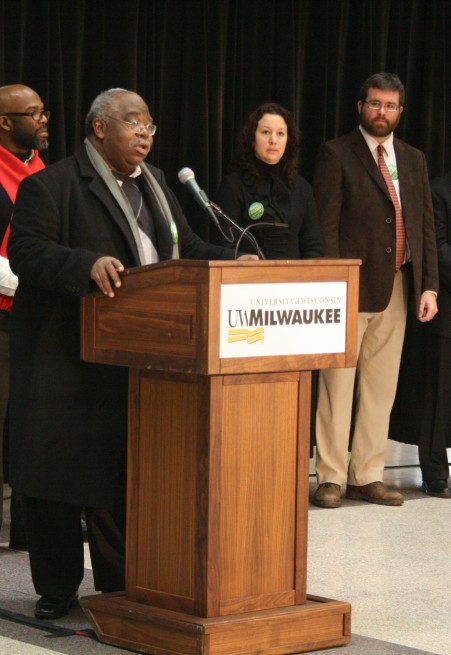Suburbs Overwhelmingly Want to Reduce Size of the Milwaukee County Board of Supervisors

Supervisor Michael Mayo introduces new MCTS MetroExpress Service. Supervisors Marina Dimitrijevic and Jason Haas look on.
Almost all of Milwaukee County’s suburbs had a referendum question that asked for voter’s opinions on reducing the size of the Milwaukee County Board of Supervisors and reducing the position to part-time during Tuesday’s election. In every community it was asked, voters overwhelmingly voted to reduce the number and pay of supervisors, but what would that achieve?
If the goal is to fix the existing financial issues, simply shelling out less for the Milwaukee County Board is only going to save a penny or two when Milwaukee County is increasingly a dollar short.
If the goal is to prevent another pension scandal or to reduce the number of politicians that can possibly be charged with crimes (Johnny Thomas and Toni Clark come to recent memory), I’m not sure eliminating positions or reducing their pay would help.
Here is what I do know. The size of the Milwaukee County Board should get smaller, but with it changes need to come to how Milwaukee County delivers services.
Cutting for the Sake of Cutting
Simply reducing the size of the Milwaukee County Board of Supervisors, and paying those left less money, will not lead to better candidates. If there are fewer Supervisors, the following will still be true.
- The Milwaukee County Transit System will still lack a dedicated funding source.
- The Milwaukee County Park System will still have to fight for every penny.
- Sheriff David Clarke will still have County Executive Chris Abele to fight with over the sacred cow of Sheriff’s Department funding.
- The County Executive will still occasionally butt heads with the County Board, although thankfully less often than the last County Executive.
- A number of Supervisors will still seek to leave for greener pastures (the Milwaukee Common Council pays more than $20,000 a year more already), continually leaving a number of districts in a state of flux with regard to their representation (Incomplete list of recent departures for other offices: Chris Larson, Tony Zielinski, Elizabeth Coggs, Eyon Biddle).
Paying Supervisors less and asking more out of them seems like a recipe for disaster.
Suburban voters have clearly signaled their displeasure with the Milwaukee County Board (which certainly isn’t a new thing), but cutting the number of Supervisors in half and hoping for more efficiency and lower taxes is akin to giving someone half as much time to take a test and hoping for better results. Milwaukee County’s issues can’t be fixed by simply eliminating elected officials.
Service Delivery and Governance
Milwaukee County should be focusing on securing dedicated funding and independent authorities for things like parks, transit, and the airport, not simply cutting the size of the Board for the sake of cutting the size of the Board.
Authorities, with their own elected or appointed bodies, single mission, and dedicated funding source, would be free of the ugly political fights that pit one service versus another marring the budget process and leaving everyone with a bad taste in their mouth. As the authorities are created the size of the board could be reduced (and be used as a way to entice the suburbs to go along with authority creation). The size of the Milwaukee County Board should get smaller, but with it changes need to come to how Milwaukee County delivers services.
















While I agree with the spirit of what you wrote, I still see the value in cutting the size of the board. As far as I can see, the board is an unaccountable rabble that rise from some of the most gerrymandered districts in WI.
At the core is a lack of accountability, especially with the high number of supervisors. Each can point left or right & claim they can’t make a difference. Each significant department can be spun off & be better managed because of it. I’m not saying that Milwaukee county gov’t is failing necessarily because of the representatives, I’m saying it’s failing because its structure is inherently flawed. Why try to ride a bicycle with square tires?
I do agree with making the County Board smaller but the counties surrounding Milwaukee County need to really shrink the size of their county boards to the current size of the Milwaukee County Board of 18 supervisors. Ozaukee County currently has 31, Washington County 30, Jefferson County 30, Kenosha County 28, Waukesha County 25, Racine County 23. All of these counties need to follow the example of Walworth County which has only 11 county board members. That is the approach the entire region should look towards as a fair size for a County Board.
I’ve bought the argument that the board shouldn’t be cut in size. Every cut in size increases the money involved in a race, which is likely to increase suburban influence of races all over the place. I see no problem with a “large” board. I like the concept, at least in theory, of a large board that is closer to the citizens than a small board full of big-money suits who take themselves too seriously.
However, it’s a part-time job and they should be paid part-time wages. Some of them treat it as the part-time job that it is and then just take the full-time compensation and run with it. Others attempt to justify the full-time pay by micromanaging in the inefficient and counterproductive way that only an amateur politician can. Their constituent contact and workload is far closer to the part-time school board than the full-time common council, and they all know it. Take the money saved, easily over half a million/year, and spend it on transit routes.
Part-time supervisors, I think, will be more interested in fixing the structure of the county so as to make it more fiscally sustainable. It’s not at all a recipe for disaster. Really, for lots of reasons, sticking with what they have now is the biggest recipe for disaster out of all the options involved.
The suburbs, I suspect, will never go with the creation of any authority – particularly transit and particularly when it’ll involve a regional sales tax. For them to go for it, it would take much more than reducing the size of a board to move them as 9 of 10 suburbanites only care about the board when they occasionally read an article about Lee Holloway (and even then, half of them get the county board and common council mixed up). Reducing the board will happen by state legislative fiat. Likewise, the authority will happen when the Milwaukee delegation stops being useless and when Milwaukee voters, for once in the history of the city, hold a Democratic governor accountable.
If the position were part-time this would allow more people to be involved in government.
Thanks for taking time to write about this, Jeramey.
I think that we actually should be increasing the size of the board if people feel underrespresented. This is nothing but a pretty thinly veiled attempt by the GMC to attack a generally progressive, minority-led county board which has been more concerned with the needs of their constituents than the big-business interests that the GMC represents. Transfering control of things like parks and transit to an unelected board just gives more power to rich white men who don’t use them. Get ready to say hello to more “tough choices” (aka service cuts that disproportionately affect the poor)…
As far as pt supervisors go, I’m not sure how I feel about that. I personally know a number of supervisors who work more than full time researching legislation before they vote on it, engaging constituents, attending meetings and committees, etc. I don’t think the average working person would be able to do all of this and hold down a second job. I’d probably agree with it if we doubled the size of the board in return, but not if the number of supervisors stays the same or decreases…
With David Cullen(State rep and Milwaukee county) and Spencer Coggs(State Senator and MKE Treasurer) doing two government positions now just shows that it should be part time.